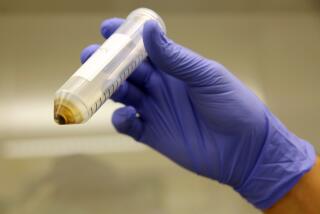Element in Diet, Cold Drugs Ruled Unsafe
- Share via
GAITHERSBURG, Md. — An ingredient in dozens of popular over-the-counter diet and cold medicines may be responsible for several hundred hemorrhagic strokes annually in people under age 50, government scientists said Thursday.
Manufacturers insist that concern is overblown about the decades-old ingredient--called phenylpropanolamine and found in products ranging from Dexatrim to Triaminic. They argue that there is no proof the drug causes hemorrhagic strokes or bleeding in the brain.
But the Food and Drug Administration’s advisors voted Thursday that phenylpropanolamine cannot be classified as safe, a classification critical to a drug’s ability to sell without a prescription.
The FDA already was considering banning nonprescription phenylpropanolamine, or PPA. The advisory panel’s 13-0 vote, with one abstention--while not directly addressing the question of a ban--strengthens that possibility. The FDA is not bound by its advisors’ decisions but usually follows them.
The risk for the average dieter or cold sufferer in using PPA is very small, according to the FDA and Yale University researchers who studied the issue. Six billion PPA doses are sold in this country annually, yet hemorrhagic strokes in young people are rare.
“The message for women should be, PPA does appear associated with an increased risk of hemorrhagic stroke but it is not a huge risk,” Yale medical professor Walter Kernan said. Some FDA advisors said consumers should know they can choose over-the-counter decongestants without PPA.
Hemorrhagic strokes are the least common type of stroke, but they often are deadly and can be disabling. They are rare in young people: The FDA estimates that of 130 million Americans ages 18 to 49, about 10,400 suffer hemorrhagic strokes each year. Risk rises with age and other factors, including high blood pressure, smoking and use of blood-thinning drugs or alcohol.
Doctors’ first warning sign about PPA came in the 1980s when medical journals cited several dozen puzzling cases of young women who suddenly had strokes within days of taking appetite suppressants.
The FDA’s records show 44 cases of hemorrhagic stroke among PPA users in the last 30 years. Most were women; the median age was 35.
Those cases are “literally the very tip of the iceberg,” said the FDA’s Lois La Grenade, noting that the agency learns of fewer than 10% of the serious side effects drugs cause each year.
The study found that PPA increases stroke risk for young women under two circumstances: within three days of taking PPA-containing appetite suppressants, or within three days of taking their first PPA dose for any reason.
The results are statistically significant, La Grenade said, and suggest that PPA ultimately could be the cause of 200 to 500 strokes a year in people under age 50.
The Consumer Healthcare Products Assn., which represents manufacturers of nonprescription medicines and dietary supplements and funded the Yale study, now says the university’s research is flawed. The group complains that the numbers are too small to prove blame and that researchers excluded stroke victims who died or were left unable to speak--necessary because those people’s PPA use couldn’t be determined.






